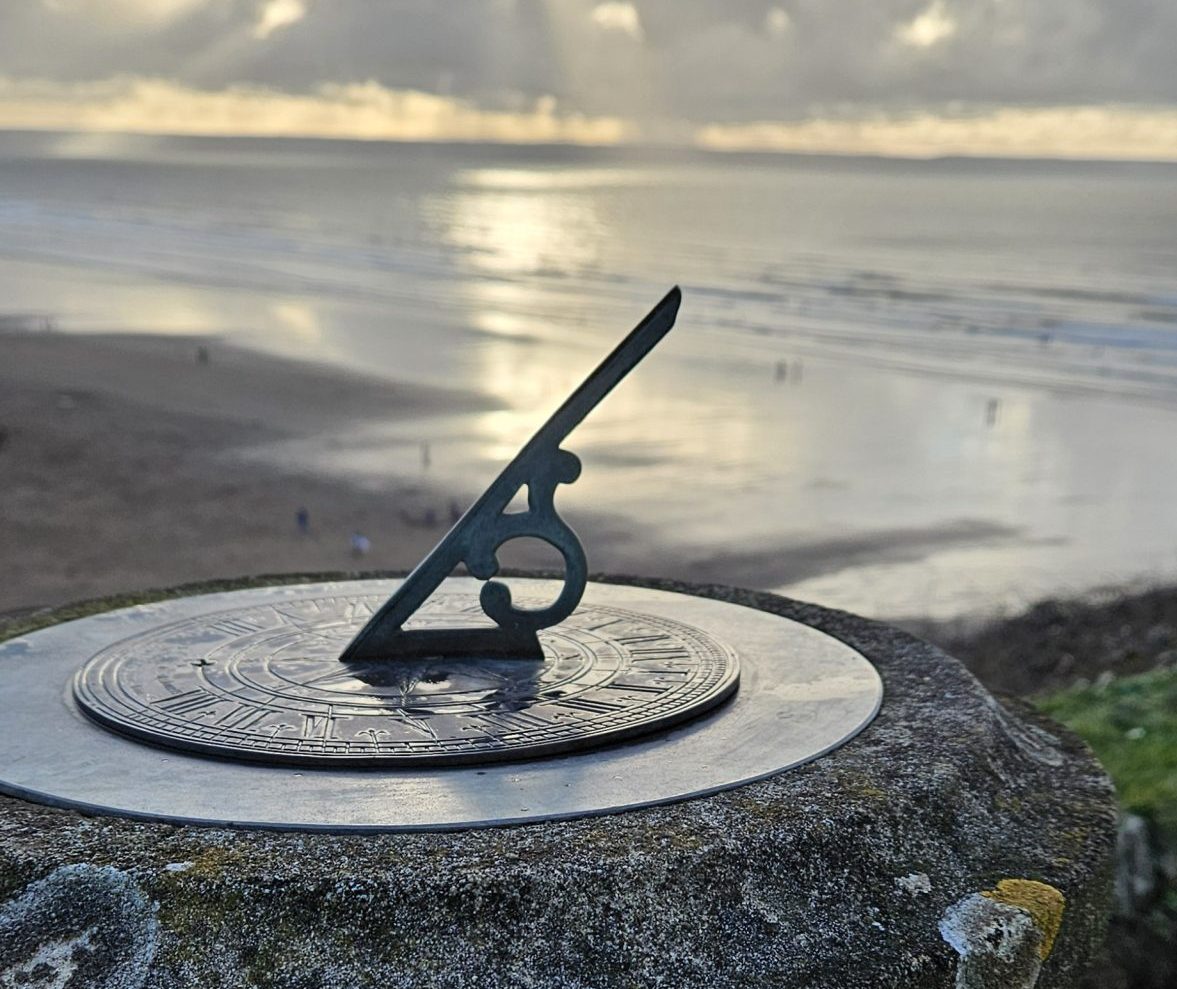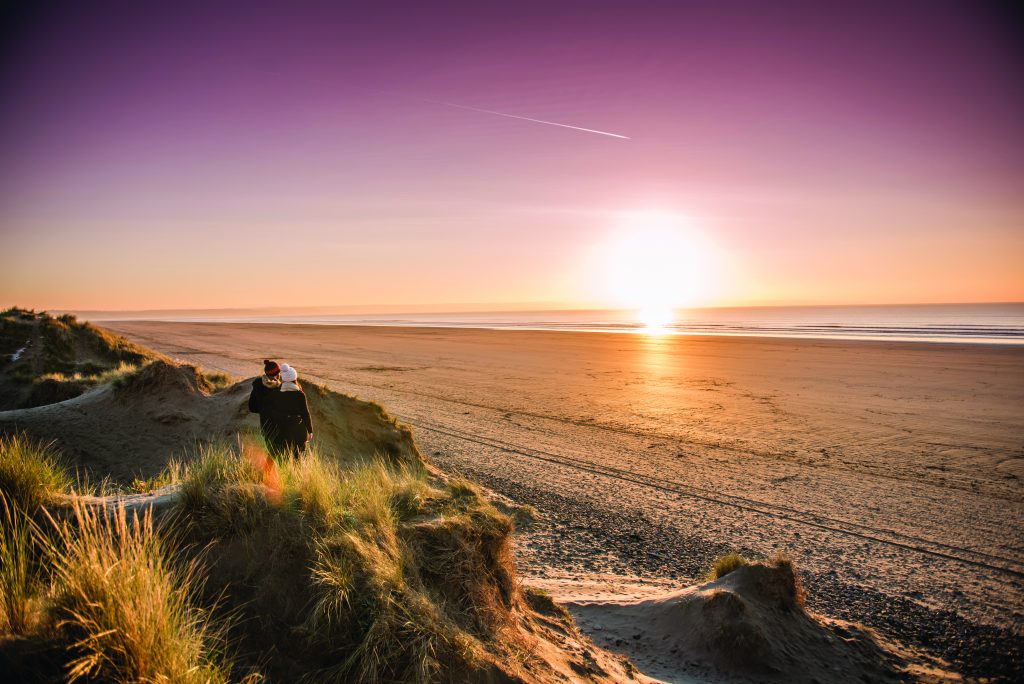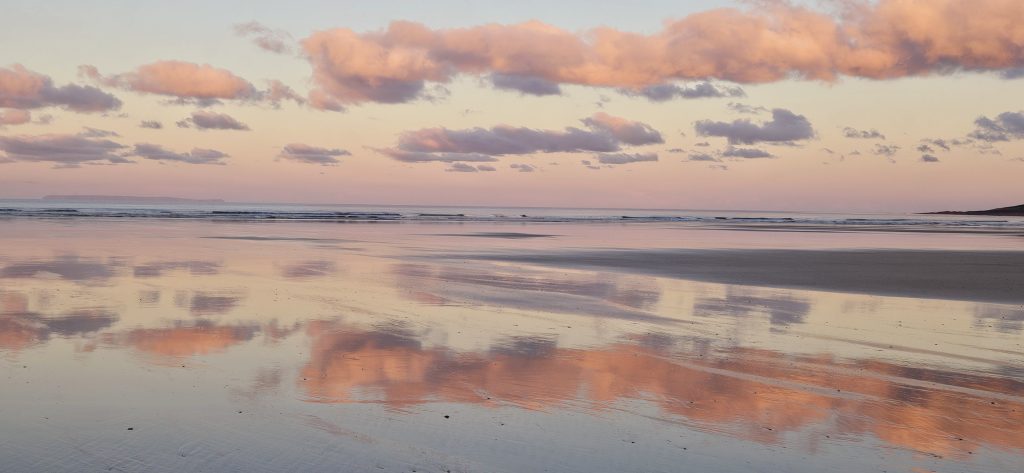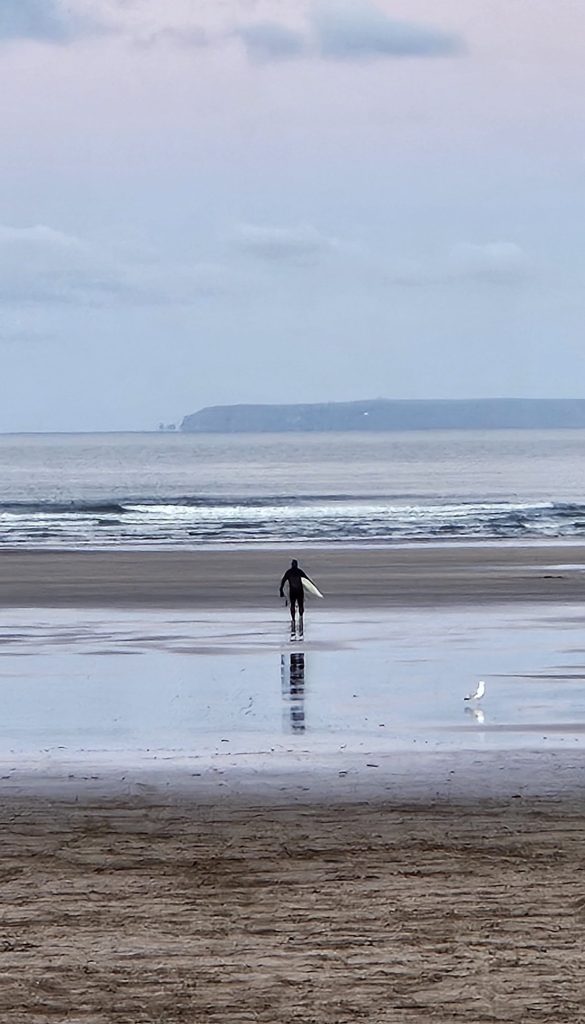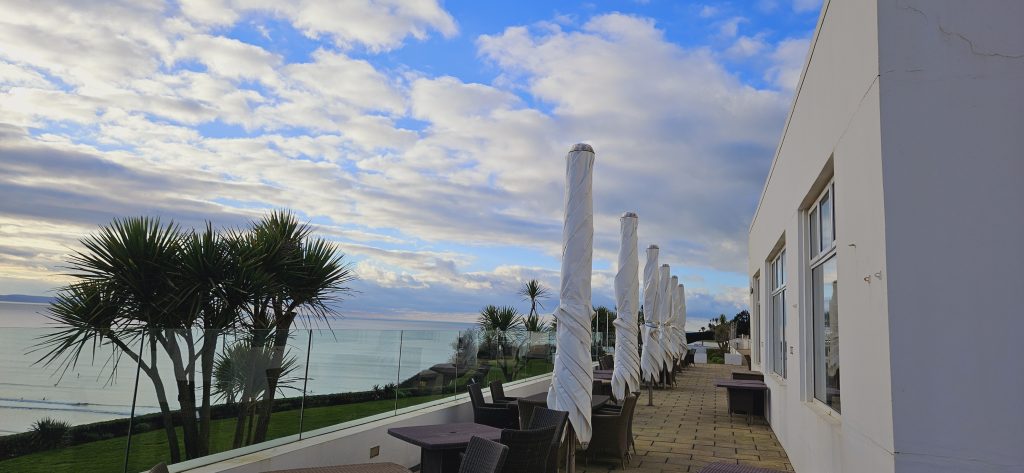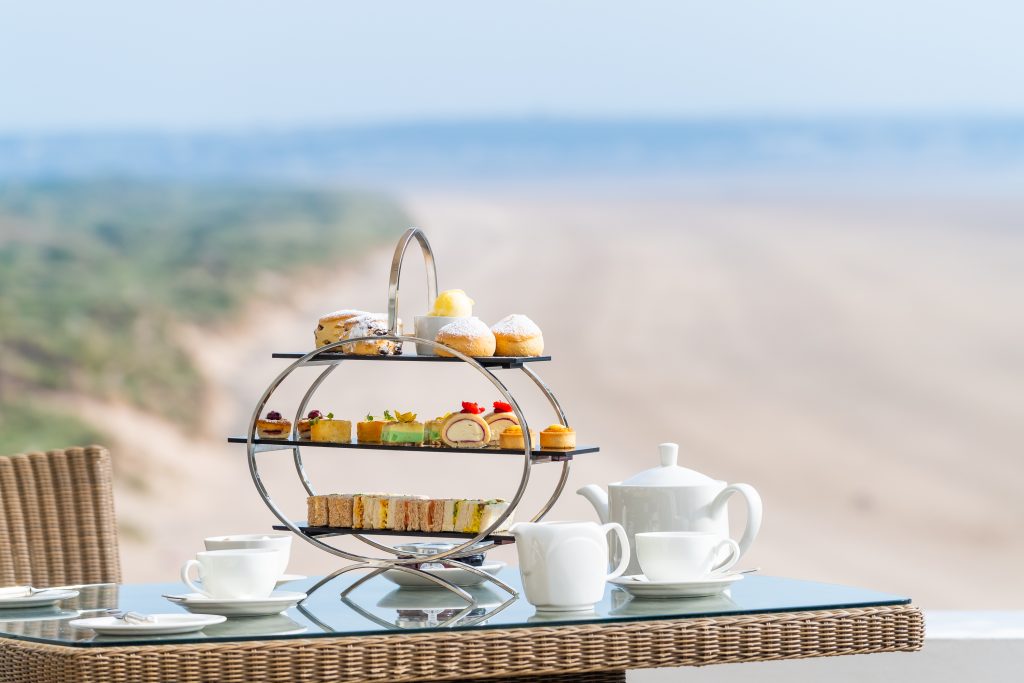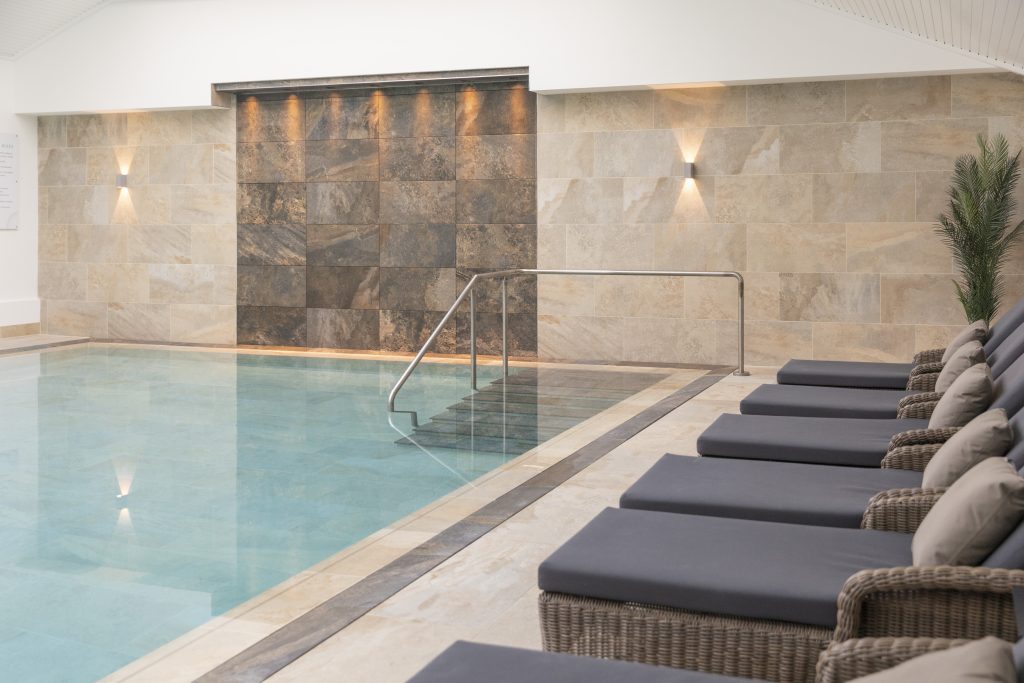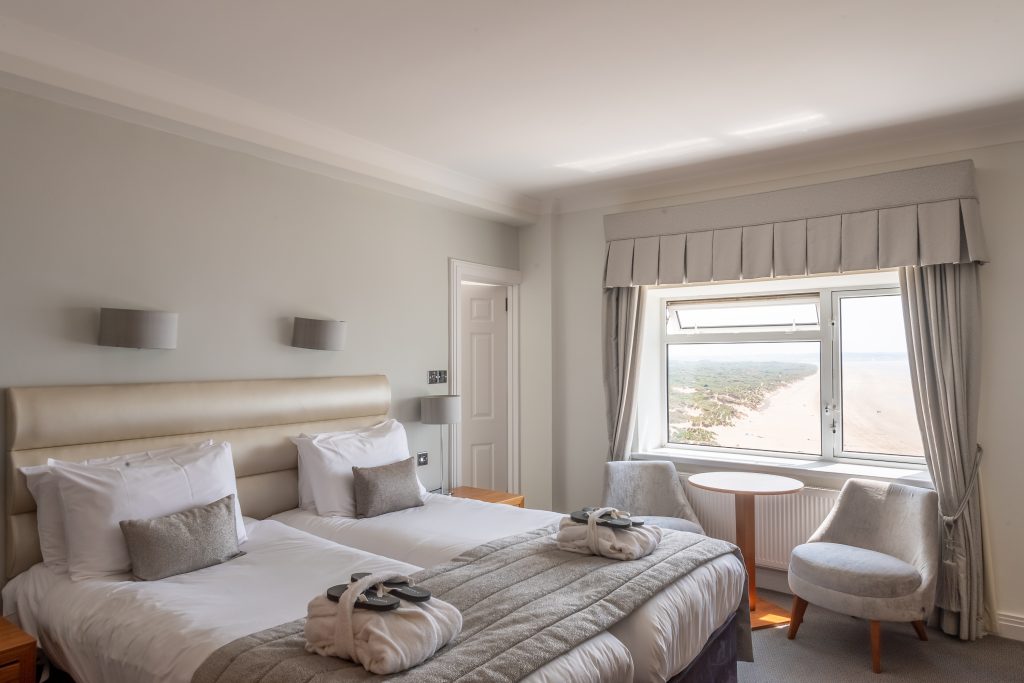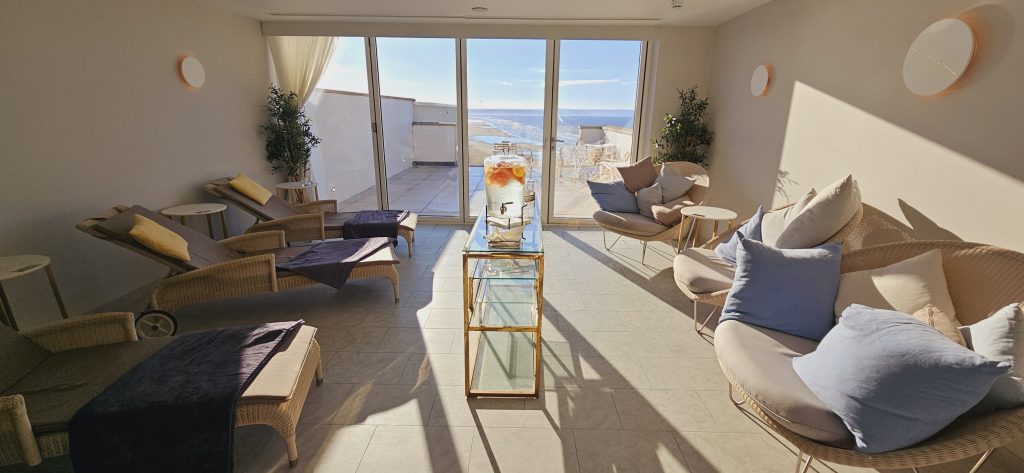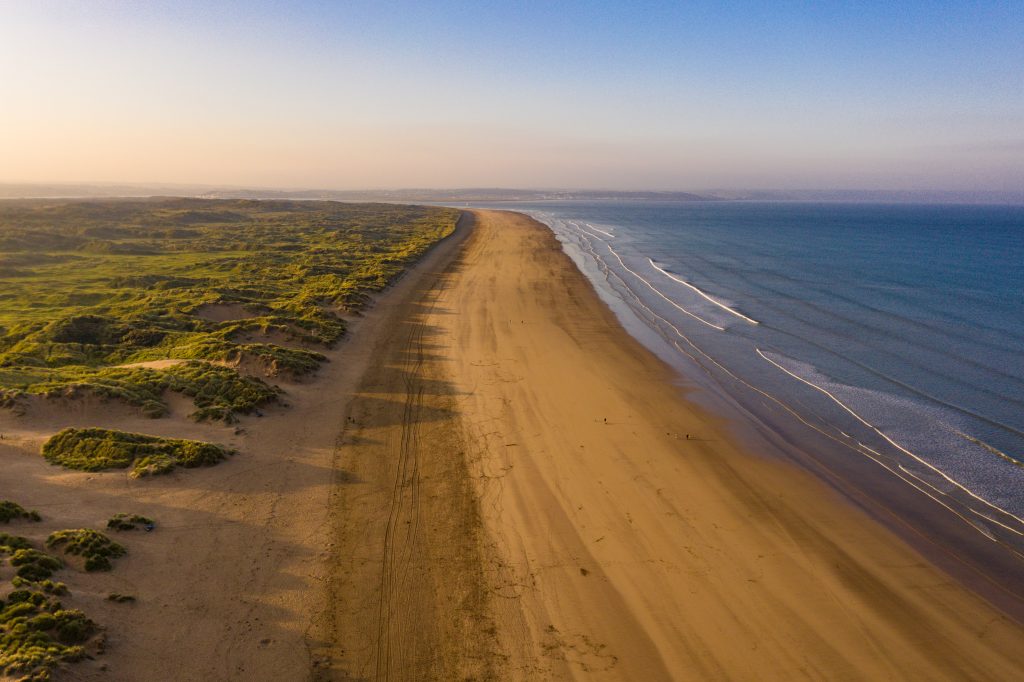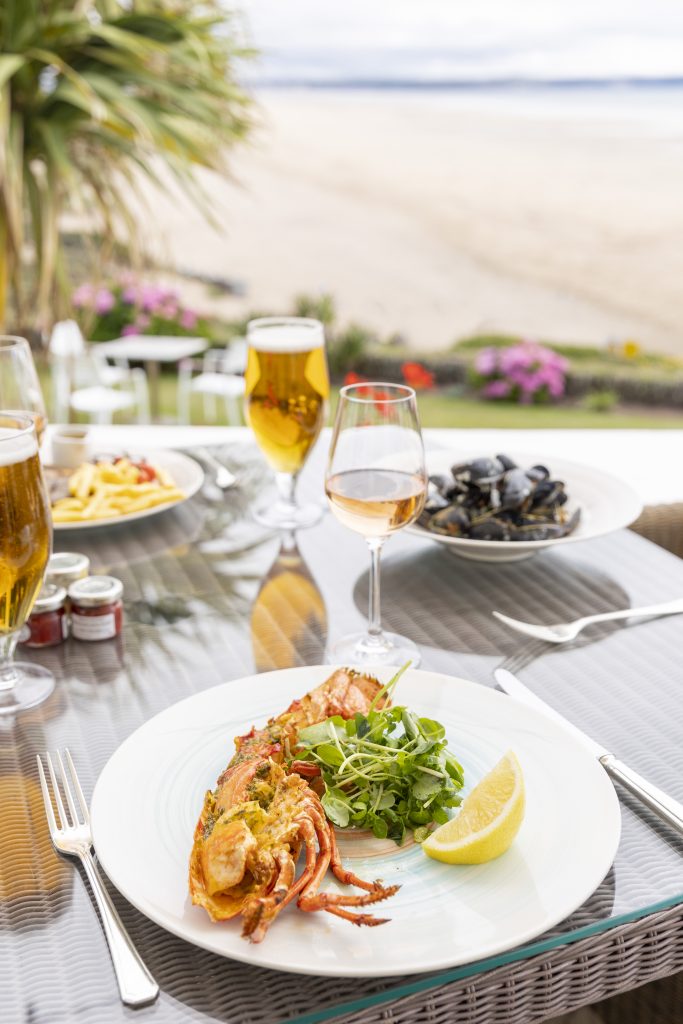ABOUT
EARLY-BIRD REGISTRATION ENDS MAY 30. Low-priced rooms are limited. See the registration link below.
A Writing Haven Within Nature’s Embrace
Embark on an artistic journey at the Retreat at Saunton Sands. Nestled along the stunning coastline of one of the most beautiful counties in England, this unparalleled retreat takes full advantage of the natural wonders that define the Devon landscape.
Boasting panoramic views of the pristine Saunton Sands beach and the rugged beauty of the UNESCO Biosphere Reserve, the retreat offers an oasis of calm amidst the stunning natural landscape. The landscape itself serves as a muse, cultivating an atmosphere of peace and focus. From the moment you arrive, you will be greeted by the gentle sound of waves and the invigorating scent of sea air in September.
Perched on rugged cliff overlooking the beach, the Art Deco Saunton Sands Hotel serves as the base. Braunton Burrows, the largest sand dune ecosystem in England with nearly 500 varieties of flowers, stretches for miles while the picturesque South West Coast Path meanders along the hills and through the dunes.
A Sanctuary for Mind, Body, and Spirit
The Retreat at Saunton will be a sanctuary to start your writing journey, ignite your creativity, and invest in your writing practice.
Founded by New York Times bestselling author and award-winning arts administrator Kathryn Aalto, the philosophy for the retreat reflects her joie de vivre, sense of community building, and expertise in narrative non-fiction. She brings together friends both new and old, near and far, to make this a transformative experience for the mind, body and spirit with lectures, panels, experiential workshops, excursions, and time to reflect and unplug.
These include Mike Brown, the celebrated CalTech astronomer who wrote How I Killed Pluto and Why It Had it Coming, to provide inspired instruction. At the same time, there is also ample opportunity for self-reflection and time to connect and converse with others over drinks, meals, and walks along the beach.
The Retreat at Saunton Sands includes lively lectures, enriching workshops, and thought-provoking panels by a wide variety of people: bestselling authors, scholars, mentors, publicists, publishers, master teachers, business coach, and Kathryn’s students-turned-award-winning-writers. Magic happens in unscheduled time meeting people who may become lifelong friends.
Space is limited to 50. Book your place now at early-bird registration rates until May 30 due to limited room allocation.
If you have questions, contact us at kathryn@kathrynaalto.com.
DATES
TUITION
The cost of the retreat includes meals, accommodation, and education. Please click the REGISTER button below to explore different room options (inland or sea-facing, single or double).
- All lectures, workshops, and panel discussions
- All meals from dinner on Thursday to lunch on Sunday (includes vegan/vegetarian options, excludes alcohol)
- Three night’s stay at the Saunton Sands Hotel North Devon’s Leading Luxury Hotel & Spa | Saunton Sands | North Devon
- Open mic night for people to read their work aloud
- Three after-dinner author talks
- Transportation for stargazing to Exmoor National Park, an International Dark Sky Preserve
- Access to pools, spa, and exercise facilities
Additional: There are limited spaces for a 30-minute one-to-one meeting with Kathryn to discuss and receive detailed written feedback 25 pages of writing. Enquire at kathryn@kathrynaalto.com.
DESCRIPTION
Between Thursday’s cocktail party and Sunday’s last lecture, you will have the choice of diverse and enriching learning experiences, including the following. Details are below. More speakers will be announced soon.
DETAILS
- “Humanising Science with the Art of Storytelling” (Mike Brown) As written in The Atlantic: “We all grew up learning, in school, that there were nine planets in the solar system. We never thought much about it: That’s just the way it was. But in 2005, Mike Brown, a professor of planetary astronomy at the California Institute of Technology, discovered a tenth. As he explains in his new book, How I Killed Pluto and Why it Had it Coming … this is something he had been working toward his whole life. That day of discovery was one of the best days of his life, second only, perhaps, to the day his daughter, Lilah, was born. But the excitement only lasted so long. Brown’s discovery ignited a year-long debate over how, exactly, to define a planet. And when things got out of control, when too many bodies were being upgraded to planetary status, it was Brown who had to step in and demote his own discovery, the largest object found in the solar system in 150 years, and, along with it, beloved Pluto.” His book, How I Killed Pluto and Why It Had it Coming is Mike’s bestselling memoir about the personal and professional dramas during a momentous time. Combining science writing with memoir, the book is accessible, readable, and funny all the while maintaining scientific accuracy. But how did he do it? What techniques of memoir, narrative nonfiction, and science writing did he draw upon? A writing workshop with lessons for all who aspire to write narrative nonfiction, this is sure to be a treat for writers.
- “Overcoming Limiting Self Beliefs” (Tom Chatfield) “What’s in the way, is the way.” A valuable session for all writers, this session draws from a broad range of perspectives in realms such as psychology, yoga, shamanic practice, and business leadership. Tom Chatfield will introduce us to his journey in overcoming limiting self / core beliefs. He’ll share learnings and tools from systems, both ancient and modern, to help each of us to gain confidence, overcome obstacles, and ultimately step further toward occupying the “higher self” in us all. You’ll hear about Tom’s own journey to foster a greater sense of connectedness with the people in his life, as well as learn some simple exercises that you can replicate and repeat to identify what’s holding you back and how to move forward.
- Walking Meditation (Tom Chatfield) Tom will open the morning with a guided walking meditation on Saunton Sands. This is a practice that many find to be a powerful way of cultivating a positive shift in state of consciousness. It can also provide an accessible alternative to better-known “sitting meditation.” Studies have shown that this practice can reduce and regulate cortisol levels, our primary stress hormone, and consequently lead to better general health outcomes and even neurological regeneration. Though we won’t ask anything strenuous from you — comfortable, weather appropriate clothes will help you to get the most from this session, as well as being prepared to go barefoot (or at least shoeless).
- “Ecopoetry: The Poetic Subject” (Tarn MacArthur) In this session we will look at how ecopoems directly address the poetic subject as a vehicle for personal, social, and environmental interrogation. While traditionally environmental poetry has focused more strictly on elevating the poetic subject by almost isolating it from the rest of the world, ecopoems use various poetic techniques to demonstrate the interconnected nature of beings and things. Here, we will consider how different poetic techniques, from repetition and metaphor to masking and apostrophe, work to reframe perspective in ways that engage a more-than-human vision of the world. Sometimes the poetic subject is a landscape, as in the Romantic works of William Wordsworth; other times it is an individual being or thing as in James Wright’s poem, ‘To a Blossoming Pear Tree’; other times still, the poetic subject is a complex ecosystem like that found in Elizabeth Bishop’s poem, ‘The Riverman’. Through analysing and discussing these various techniques, we will consider the ways in which the poetic subject is present in all forms of environmental writing, and different writing prompts and exercises will be distributed to help integrate such techniques into your own work.
- “Ecopoetry: Navigating the Lyric Moment” (Tarn MacArthur) In this session we will consider the different ways that poetry and prose navigate the lyric moment, specifically through the stoppage of time and the breaking of linear narration. The lyric moment allows the poet or writer to expand and compress temporalities and bring a tension between the perspectives of the speaker/narrator and the reader, often by hinting at further meanings, narrative potentialities, and characterisations, without ever fully divulging them. Sometimes this can be achieved through simple shifts between narration and description, other times it arises through rhetorical repetition or the breaking of linguistic patterns. By reading works that range from Gary Snyder’s ecopoems to Matuo Bashō’s travelogues, we will analyse and discuss the various ways the lyric moment functions and the effects it has on text and reader. Based on these readings and discussions, writing prompts and exercises will also be distributed to help consider how these techniques might be adapted to your own writing projects.
- “Tackling Big Themes” (Sophie Pavelle) How do you tackle complex, all-encompassing themes in your writing, whilst still maintaining narrative, author voice, and creativity? Specifically focusing on topical themes like climate change, biodiversity loss, the millennial perspective, and travel, this workshop will explore methods of dissecting challenging subject matter to add impact to your writing. This workshop will be a hybrid of lecture, individual reflection, and group discussion.
- “The Story Behind The Story” (Sophie Pavelle) What’s the story behind the story? This talk goes behind-the-scenes of modern narrative non-fiction in the nature / travel writing genre. From the conception of the idea to the proposal, pitching, and commissioning process with major publishers to working with literary agents, editors, and the lone writing / travel process and method, audiobooks, and publicity campaign. This will be a thorough first-person account of the entire journey of writing a book, including the highs, lows, and many lessons learned along the way. Group discussion and Q & A to follow — nothing is off limits.
- The Publicist and Publisher Panel. A panel with Rebecca Rochester, publicist for Hachette Books and Adrian Cooper, publisher for Little Toller. They will discuss trends in publishing, best methods for approaching publishers, how publicists and publishers work together, and ways that writers can help spread news of their books.
- Prize Winning Circle. Listen to the ways several of Kathryn Aalto’s students became award-winning writers from how they prepared to what they plan to do next with these accolades. Joining us will be Emma Willcott, 2023 winner of the Bradt New Travel Writer of the Year, and Nicola Pitchford, winner of The Nature Chronicles Prize in 2022.
- The Eight Pillars of Narrative Nonfiction (Kathryn Aalto) Details posted on Monday, April 29th.
- The Shiver of Recognition: Dilating from the Personal to the Universal (Kathryn)
- “Writing Memoir: Showing Up on the Page as Authentic or as a Persona” (Kathryn)
- Research for Writers (Kathryn)
TEACHERS & SPEAKERS
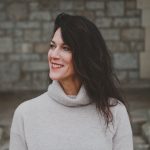 Retreat founder Kathryn Aalto is a teacher, historian, speaker, designer, and New York Times bestselling author. She is the author of three books and writes essays for international magazines including Smithsonian, Outside, and more. She was judge for the inaugural Nature Chronicles Prize and is a trustee of The Ashdown Forest Foundation. With author James Rebanks, she founded the Rural Writing Institute, a community that created A teacher of narrative nonfiction on and offline, her students win literary prizes, sign book deals, and enjoy writing as an expression of well-being. As an embodied writer, she is often present in her writing and encourages her students to do the same as it helps the reader feel more present in the experience.
Retreat founder Kathryn Aalto is a teacher, historian, speaker, designer, and New York Times bestselling author. She is the author of three books and writes essays for international magazines including Smithsonian, Outside, and more. She was judge for the inaugural Nature Chronicles Prize and is a trustee of The Ashdown Forest Foundation. With author James Rebanks, she founded the Rural Writing Institute, a community that created A teacher of narrative nonfiction on and offline, her students win literary prizes, sign book deals, and enjoy writing as an expression of well-being. As an embodied writer, she is often present in her writing and encourages her students to do the same as it helps the reader feel more present in the experience.
At the retreat, Katy teaches:
- “An Introduction for Beginners: Nine Pillars of Narrative Nonfiction”
- “The Shiver of Recognition: Dilating from the Personal to the Universal”
- “Writing Memoir: Showing Up on the Page as Authentic or as a Persona”
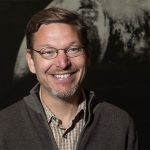 Mike Brown scans the skies searching for and intensely studying distant bodies in our solar system in the hope of gaining insight into how our planet and the planets around it came to be. In this quest, he has discovered dozens of dwarf planets, and demoted one object from planet to dwarf planet, which he documented in his award winning bestselling memoir How I Killed Pluto and Why It Had It Coming. His writing has appeared in the New York Times, The Washington Post, The Wall Street Journal, and many other locations. He is currently hot on the trail of Planet Nine — a hypothesized body that is possibly the fifth largest planet of our solar system. He is the Richard and Barbara Rosenberg Professor of Planetary Astronomy at the California Institute of Technology and has been on the faculty there since 1996. He has won many awards and honors for his scholarship, including the Urey Prize for best young planetary scientist from the American Astronomical Society’s Division of Planetary Sciences; a Presidential Early Career Award; a Sloan Fellowship; the 2012 Kavli Prize in Astrophysics; and, of course, the one that started his career, an honorable mention in his fifth-grade science fair. He was inducted into the National Academy of Science in 2014. He was also named one of Wired Online’s Top Ten Sexiest Geeks in 2006, the mention of which never ceases to make his wife laugh. You can listen to his TED talk to learn more.
Mike Brown scans the skies searching for and intensely studying distant bodies in our solar system in the hope of gaining insight into how our planet and the planets around it came to be. In this quest, he has discovered dozens of dwarf planets, and demoted one object from planet to dwarf planet, which he documented in his award winning bestselling memoir How I Killed Pluto and Why It Had It Coming. His writing has appeared in the New York Times, The Washington Post, The Wall Street Journal, and many other locations. He is currently hot on the trail of Planet Nine — a hypothesized body that is possibly the fifth largest planet of our solar system. He is the Richard and Barbara Rosenberg Professor of Planetary Astronomy at the California Institute of Technology and has been on the faculty there since 1996. He has won many awards and honors for his scholarship, including the Urey Prize for best young planetary scientist from the American Astronomical Society’s Division of Planetary Sciences; a Presidential Early Career Award; a Sloan Fellowship; the 2012 Kavli Prize in Astrophysics; and, of course, the one that started his career, an honorable mention in his fifth-grade science fair. He was inducted into the National Academy of Science in 2014. He was also named one of Wired Online’s Top Ten Sexiest Geeks in 2006, the mention of which never ceases to make his wife laugh. You can listen to his TED talk to learn more.
At the retreat, Mike teaches:
- “Humanising Science with the Art of Storytelling”
- After-dinner talk on Friday night
- A night sky talk in Exmoor National Park on Saturday night
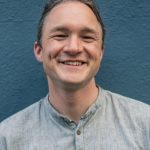 Tom Chatfield runs Make Hay, the regenerative consultancy helping leaders and their teams maximise performance, nurture their people, and refine their processes. His journey began growing up on his father’s sheep farm on the edge of Dartmoor, which also led to a professional interest in artisanal foods that he continues by travelling around the world to judge and promote artisanal cheeses. Tom has a talent for seeing novel connections and relationships in things that are seemingly unconnected, which has led him to combine knowledge from various realms such as yoga, shamanism, and psychology into his philosophy and work. Tom’s passion is in helping others find their passion and place in the world, and writers will benefit from his knowledge in this way.
Tom Chatfield runs Make Hay, the regenerative consultancy helping leaders and their teams maximise performance, nurture their people, and refine their processes. His journey began growing up on his father’s sheep farm on the edge of Dartmoor, which also led to a professional interest in artisanal foods that he continues by travelling around the world to judge and promote artisanal cheeses. Tom has a talent for seeing novel connections and relationships in things that are seemingly unconnected, which has led him to combine knowledge from various realms such as yoga, shamanism, and psychology into his philosophy and work. Tom’s passion is in helping others find their passion and place in the world, and writers will benefit from his knowledge in this way.
At the treat, Tom teaches:
- “Overcoming Limiting Self Beliefs”
- “Walking Meditation” on Saunton Sands
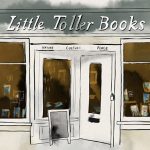 Adrian Cooper is publisher of Little Toller Books, a small, independent, and discerning press started with a singular purpose: to revive forgotten and classic books about nature and rural life in the British Isles. Their Nature Classics series is attuned to writers and artists who seek inventive ways to reconnect people around the world with the natural world: “classic texts of rural writing and illustration brought back into beautiful existence,” as Kathryn Hughes has written in The Guardian. In addition to nature classics, Little Toller publishes memoirs, essays and monographs, biographies and anthologies, field guides, and more.
Adrian Cooper is publisher of Little Toller Books, a small, independent, and discerning press started with a singular purpose: to revive forgotten and classic books about nature and rural life in the British Isles. Their Nature Classics series is attuned to writers and artists who seek inventive ways to reconnect people around the world with the natural world: “classic texts of rural writing and illustration brought back into beautiful existence,” as Kathryn Hughes has written in The Guardian. In addition to nature classics, Little Toller publishes memoirs, essays and monographs, biographies and anthologies, field guides, and more.
At the retreat, Adrian speaks about:
- Publishing topics for nature and travel writers
- Publishing trends with publicist Rebecca Rochester
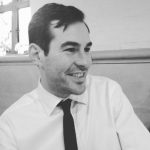 Tarn MacArthur’s poems have recently appeared in The New Republic, The New Statesman, The Poetry Review, and Poetry London. He currently teaches at the University of St Andrews where he was previously a George Buchanan Scholar researching eco-philosophy and ecopoetry. He is the recipient of grants from the Conseil des arts et des lettres du Québec and the Dorothy Sargent Rosenberg Fund, and was the Walter and Nancy Kidd Fellow in Creative Writing at the University of Oregon. He is an editor on the academic journal Green Letters, as well as a book reviewer for the Los Angeles Review of Books and Poetry London.
Tarn MacArthur’s poems have recently appeared in The New Republic, The New Statesman, The Poetry Review, and Poetry London. He currently teaches at the University of St Andrews where he was previously a George Buchanan Scholar researching eco-philosophy and ecopoetry. He is the recipient of grants from the Conseil des arts et des lettres du Québec and the Dorothy Sargent Rosenberg Fund, and was the Walter and Nancy Kidd Fellow in Creative Writing at the University of Oregon. He is an editor on the academic journal Green Letters, as well as a book reviewer for the Los Angeles Review of Books and Poetry London.
At the retreat, Tarn teaches:
- “Ecopoetry: The Poetic Subject”
- “Ecopoetry: Navigating the Lyric Moment”
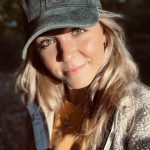 Sophie Pavelle is a science communicator from Exeter, Devon. Her debut book Forget Me Not: finding the forgotten species of climate-change Britain, was published by Bloomsbury in 2022 and won The People’s Book Prize for Non-Fiction (2023) and was long-listed for the 2023 James Cropper Wainwright Prize for Conservation Writing. She works as the Communications Coordinator for Beaver Trust. She is an Ambassador for the Wildlife Trusts and sits on the RSPB England Advisory Committee, and is a Trustee for UNESCO Exeter City of Literature. Her writing appears in New Scientist, National Geographic Traveller, The Guardian, and others.
Sophie Pavelle is a science communicator from Exeter, Devon. Her debut book Forget Me Not: finding the forgotten species of climate-change Britain, was published by Bloomsbury in 2022 and won The People’s Book Prize for Non-Fiction (2023) and was long-listed for the 2023 James Cropper Wainwright Prize for Conservation Writing. She works as the Communications Coordinator for Beaver Trust. She is an Ambassador for the Wildlife Trusts and sits on the RSPB England Advisory Committee, and is a Trustee for UNESCO Exeter City of Literature. Her writing appears in New Scientist, National Geographic Traveller, The Guardian, and others.
At the writing retreat, Sophie teaches:
- “Tackling Big Themes”
- “The Story Behind the Story”
 This year marks Rebecca Rochester’s 30th year in the publishing industry, running publicity and marketing campaigns for non-fiction books. Following her Media and Arts degree from Plymouth University, she headed off to the bright lights of London where she cut her teeth in a busy PR agency, taking on heavyweight arts publishing clients such as Taschen and Flammarion. Fast paced and highly entertaining – with everything from hosting a Soho evening for The Drag Queen Diaries to organising a launch event for ‘Bunny Bondage’ (dress code – rubber/leather/bondage gear!) – high-octane clients took their toll. She left to work for the gentler, lifestyle publishers Ryland Peters & Small. Working on beautiful rustic gardening books left her pining for the West Country and its rugged coastline, where she spent her formative years. She was fortunate to become PR & Marketing Manager for David & Charles publishers, working on their gardening and natural history lists. She shifted from David & Charles to work freelance, and soon encountered respected gardening and nature publisher Timber Press. She heads up the UK publicity and marketing operation for the Workman group – five imprints in all: liaising with editorial teams, book designers, authors, and supporting the UK and European sales divisions. She thrives on bringing communities together and showcasing amazing authors and their expertise.
This year marks Rebecca Rochester’s 30th year in the publishing industry, running publicity and marketing campaigns for non-fiction books. Following her Media and Arts degree from Plymouth University, she headed off to the bright lights of London where she cut her teeth in a busy PR agency, taking on heavyweight arts publishing clients such as Taschen and Flammarion. Fast paced and highly entertaining – with everything from hosting a Soho evening for The Drag Queen Diaries to organising a launch event for ‘Bunny Bondage’ (dress code – rubber/leather/bondage gear!) – high-octane clients took their toll. She left to work for the gentler, lifestyle publishers Ryland Peters & Small. Working on beautiful rustic gardening books left her pining for the West Country and its rugged coastline, where she spent her formative years. She was fortunate to become PR & Marketing Manager for David & Charles publishers, working on their gardening and natural history lists. She shifted from David & Charles to work freelance, and soon encountered respected gardening and nature publisher Timber Press. She heads up the UK publicity and marketing operation for the Workman group – five imprints in all: liaising with editorial teams, book designers, authors, and supporting the UK and European sales divisions. She thrives on bringing communities together and showcasing amazing authors and their expertise.
When not immersed in books, she is a Reiki Master practitioner and teacher and helps channel positive energy to help others.
At the writing retreat, Becky speaks:
- With Adrian Cooper on the Publisher and Publicity Panel
TESTIMONIALS
“For me, the Rural Writing Institute was a dream opportunity: a perfect location, and the chance to learn craft from fabulous writers rooted in the land, as well as other accomplished and prominent practitioners of poetry and creative nonfiction. What I had not expected, but has proved equally powerful, was the immediate creation of a writing community characterised by profound mutual trust and fellowship. In those few days, we began friendships — across nation, gender, age, levels of experience, and multiple other differences — that will clearly endure. That such a group of colleagues and comrades was forged during the Institute is a tribute to the transformative generosity shown by Kathryn, James, and the Rebanks family. Their trust, openness, respect, and genuine joy in the work they do spread outward to all of us. The seeds planted and nourished there have already born rich crops of creative work and professional advancement.” — Nicola Pitchford, winner of the 2022 Nature Chronicles Prize
“I’ve had the privilege of learning from Katy as part of the Rural Writing Institute, and in her Life Writing class. The class every fortnight gave me momentum and accountability, things which can be hard to muster on my own. As well as learning loads about theory, and reading some brilliantly insightful books together, I benefitted hugely from submitting writing each session and having others read it and feedback — this was something I was nervous of at the start, but it became one of the things I most valued. Katy’s experience and passion shine through, and each of us could feel that she cared about our words, and cared deeply about us becoming the best writers we can be. My writing and ideas felt safe here, which encouraged me to dig deeper. An unexpected gift of the course was the incredibly supportive community — something I hadn’t realised was so important in the writing life, but which now feels as vital as pen and paper. Thank you Katy for sharing your knowledge, experience, encouragement and passion with us, and for building such a great community.” — Elizabeth, Devon, England
“Margaret Atwood said “If you really want to write, and you’re struggling to get started, you’re afraid of something”. Kathryn fixes those nagging fears by showing writers what we have that is already good, and what we can do better tomorrow. It’s win-win, and she remakes a traditional “class” into such an enjoyable, productive journey. I’ve also been lucky enough to experience the awe-inspiring surroundings and warm community that form the bedrock of the Rural Writing Institute. It’s not often that you can genuinely say that one long weekend shifted the way you look at the world, but the effects are still with me in my reading and writing years later.” —
“I was privileged to be part of 2018’s Rural Writing Institute cohort and to meet an amazing and diverse group of writers through that. However, taking a course with Katy has been the catalyst which has not only got me into the habit of writing, but has taken that writing to a whole new level. Katy helped me to see that I could do better, through a mixture of well-managed discussion and timely, constructive feedback. She has turned me from an aspiring writer into an emerging one. It sounds cheesy, but her course really has been life-changing.” — Sarah, Yorkshire, England
“Kathryn’s workshops are absolute troves of clear, thoughtfully presented material. She seamlessly blends engaging and foundational readings, compelling lecture, and meaningful workshopping. What I was most blown away by, though, was her fierce dedication to each participant’s journey – meeting each one of us where we were and guiding us further along in our writing path. From handwritten feedback to answering questions after hours, Kathryn really went above and beyond to ensure our growth and success.” — Kimberly, Atlanta, Georgia
“I learnt so much from taking Kathryn’s Memoir and Life Writing course. Although I had published a lot of academic work, I was struggling making the transition to writing in a more personal vein and lacking in confidence. I found in Kathryn a superbly knowledgeable and lucid teacher. Through the lectures and class discussion, I learnt how to implement narrative nonfiction techniques and, in just a few weeks, saw my writing become much more engaging and evocative. I also benefited from being part of a supportive and friendly learning community, and building relationships that I expect to last far beyond the duration of the course. Finally, I really appreciated Kathryn’s warmth and positivity, both in the virtual classroom and in her individual feedback. She was an attentive and sympathetic reader of my work, giving clear guidance for improvement while simultaneously building my confidence. The course enabled me to see new possibilities in my writing and I am keen to work with Kathryn again as I continue to develop.” —
